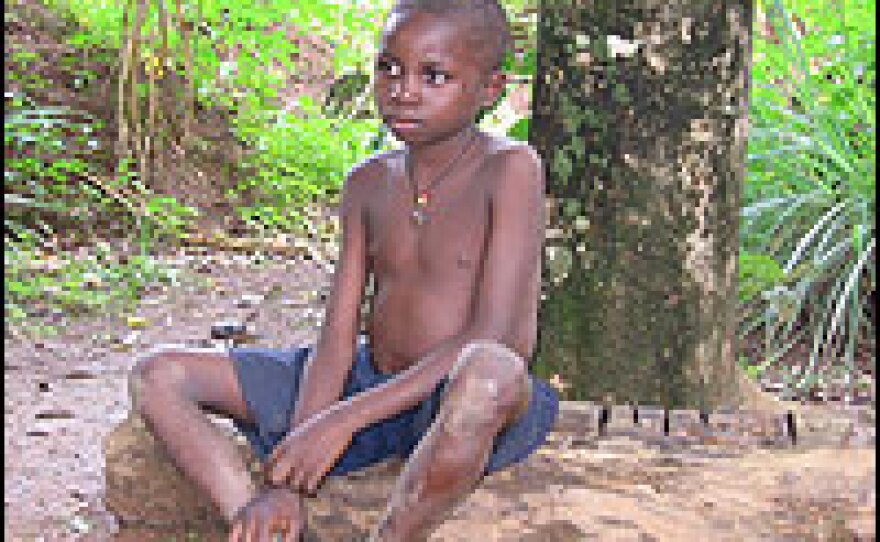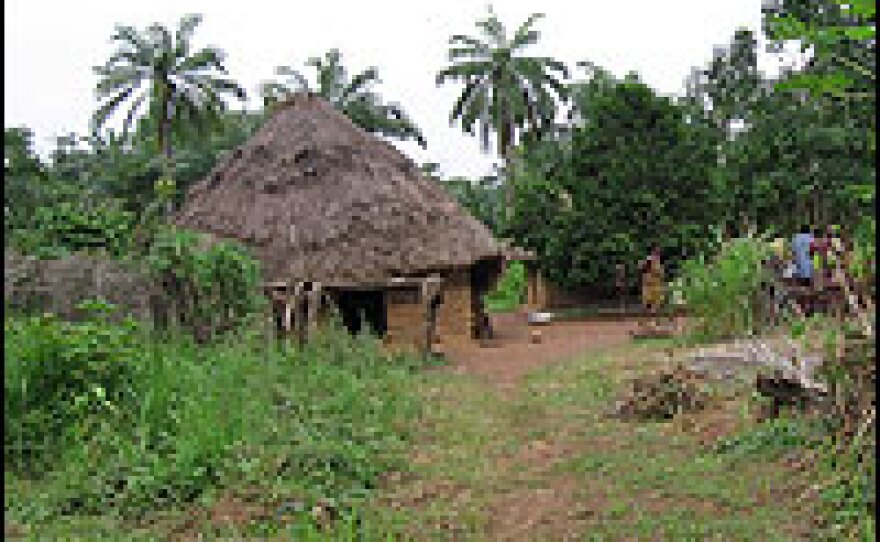

Guinea worm disease, long gone from the developed world, continues to persist in poorer nations. Now, a relentless effort to eradicate it in Nigeria is close to success. Soon, with help from U.S. donors, the Nigerian government and local health workers, guinea worm may be a problem of the past.
In the rainy season, southeastern Nigeria is dotted with ponds and lakes. Until recently, many of them harbored the debilitating guinea worm parasite.
Twenty years ago, the Carter Center in Atlanta joined up with the Nigerian government to rid the country of guinea worm, focusing on rural people who depend on ponds for their water. Nigerian physician Emanuel Miri heads the Carter Center in Nigeria.
"The problem with guinea worm is that, once they drink water that is contaminated, they are bound to have the disease," Miri says. "In 1988, there were over 650,000 cases in Nigeria."
The Carter Center began a campaign to treat the water with a chemical that kills the parasite. Miri sent people village to village to treat every pond. But getting some small villages to treat their ponds was difficult. Miri recalls a village where many people had been incapacitated for months at a time by guinea worm. Back in 2001, they still wouldn't use the chemical.
"They believed that if we treated the water, their gods, the spirit of the ancestors that offers them the protection in their village, would be destroyed," Miri says.
Miri is a persuasive man, and one who knows just about everyone in Nigeria. So he conscripted former Nigerian President Yakubu Gowon to help him convince the reluctant village elders. Miri and Gowon went to the village and talked to the leaders. In the face of such prestigious visitors, the elders agreed to have the pond treated. But when they all gathered at the pond for a ceremony, they found themselves outflanked by the village's women.
"So the women surrounded the pond and said no one was going to treat this pond, because they were not consulted," Miri says.
Miri and Gowon left to give the villagers time to think it over. Gowon went to the government and the paramount chiefs, who pressured the villagers; they relented.
"Subsequently, they invited us and said we can now come and start treatment," Miri says. Since then, there have been no guinea worm infections in the village. "We think we have made a big breakthrough."
Over the years, Miri had to overcome opposition in many Nigerian villages. Once the elders approve the water treatment, he has to convince them to add the chemical several times a year, and water treatments alone aren't enough to wipe out guinea worm. Villagers have to do more.
"The second strategy would be to educate them to agree to filter the water," Miri says.
To make sure this happened, Miri assigned Chinyere Maduka to the project. Maduka, a very determined mother of five in her late 40s, goes out to the field in lip liner and high heels. She threw herself into the effort. No water escapes her attention.
Just outside the village of Oferekpe, two young women have just drawn water into big, black, five-gallon plastic containers. Maduka won't let them go back to their homes until she makes sure they'll filter the water before drinking it.
When she visits another a village called Amainyika, Maduka quizzes the women on their filtering technique and asks for a demonstration.
Maduka is happy with what she sees in Amainyika, but she doesn't relax. She knows that guinea worm really hurts communities. In the village of Oferekpe, she stops to check on a family whose daughter had guinea worm last year — one of the very last cases in the country.
When she finds 12-year-old Josefina Okwo, they sit on a rough wooden bench in the middle of the village. Josefina describes her illness to Maduka, how a painful guinea-worm boil formed on her ankle.
The boil erupted, and the head of a two-foot-long guinea worm emerged. The disease is excruciatingly painful, and it takes many days for the worm to fully emerge. It can't be yanked out, because what remains in the leg would cause infection. Josefina has a hard time even talking about it; she points to her one-inch scar as she whispers to Maduka.
"Initially, she was going to school," Maduka translates, "going to the market, going to the pond to fetch water. But after some time, it became so painful that she couldn't do those things."
In a poor community such as Oferekpe, when people can't go to the fields for several months and children can't help their parents, the whole village suffers, Maduka says.
"Guinea worm is a disease of the poor," she says. "The hope is that once we eradicate guinea worm, it then means that all of us are rich, because we have our health. We can earn our good living, we can feel well, we can do our business and get what we want for the people."
Maduka and her boss, Miri, are certain there were only 16 cases of guinea worm last year in all of Nigeria. An outbreak of 32 more infections was just reported. That's a big disappointment — and a reminder of the vigilance that's required in the waning days of an epidemic.
Copyright 2022 NPR. To see more, visit https://www.npr.org. 9(MDAzMjM2NDYzMDEyMzc1Njk5NjAxNzY3OQ001))







